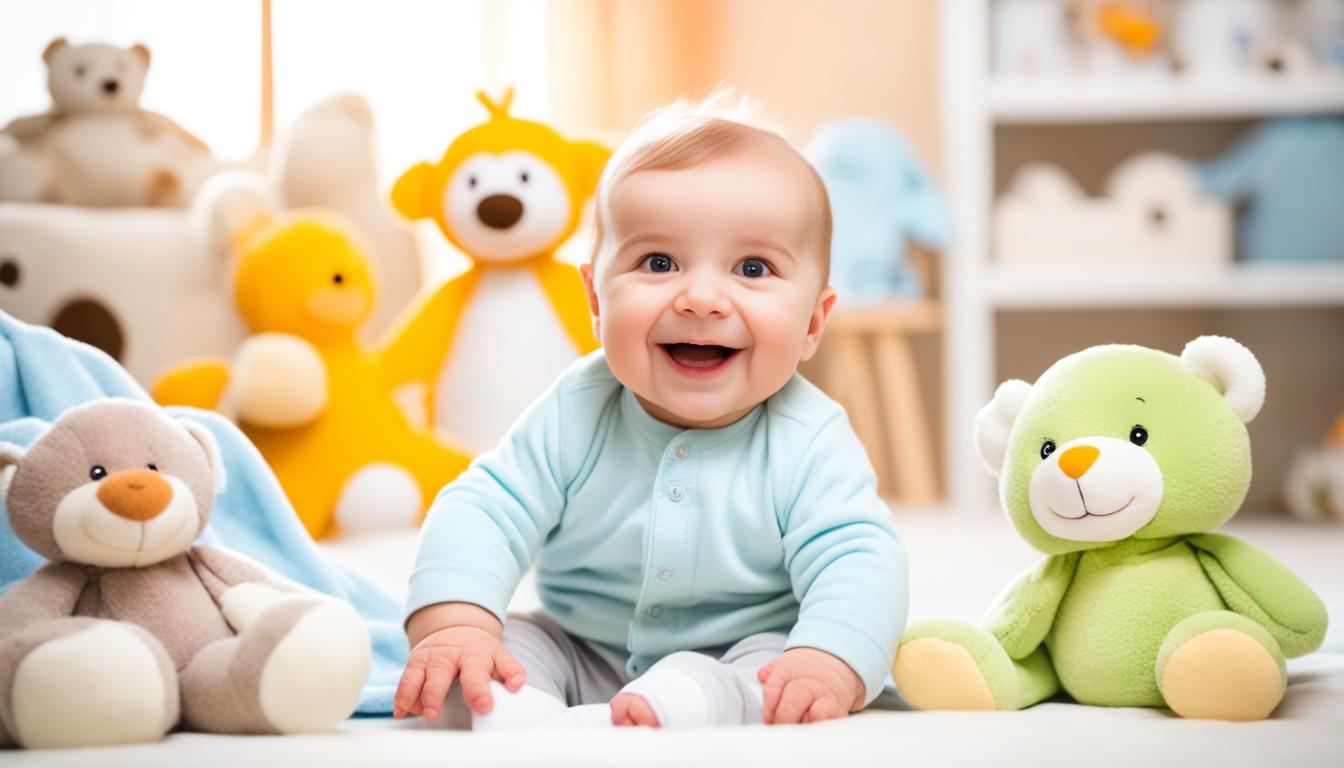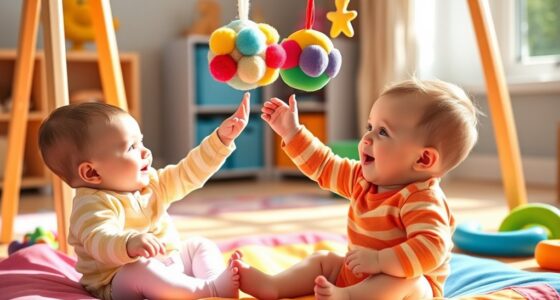By 5 months, your baby is starting to recognize familiar faces and showing excitement toward loved ones. They may display shyness around strangers, but prefer familiar voices and enjoy positive interactions. Through bonding with eye contact and interactions, they are developing trust and emotional connections. Providing a secure environment is key for their social and emotional well-being. By being responsive, they begin to engage in turn-taking activities and respond to emotions. This crucial stage lays the groundwork for understanding and expressing emotions, nurturing important social skills.
Key Takeaways
- Engages through sounds, gestures, and play to interact socially.
- Shows preference for familiar faces like family members.
- Builds trust and attachment through sustained interactions.
- Recognizes and reacts to various emotions displayed by others.
- Enhances social skills through interactive play and positive interactions.
Social Interactions at 5 Months
By 5 months, your baby begins engaging in social interactions through sounds and gestures, seeking attention and expressing emotions like happiness or frustration. At this age, your little one can differentiate between familiar faces and strangers, showing interest in interacting with known individuals. They track adults with their eyes, make eye contact, and use sounds and gestures to engage in social interactions.
Responding to your baby's cues, smiling, and playing in front of a mirror can encourage social development during this significant period. Encouraging social interactions, such as taking turns in 'conversations' with sounds, helps your baby build essential social skills at 5 months. These early interactions lay the foundation for future social development and help strengthen the bond between you and your child.
It's a delightful phase where your baby starts to explore the world through social engagement, paving the way for more intricate interactions as they grow.
Familiar Faces Preference
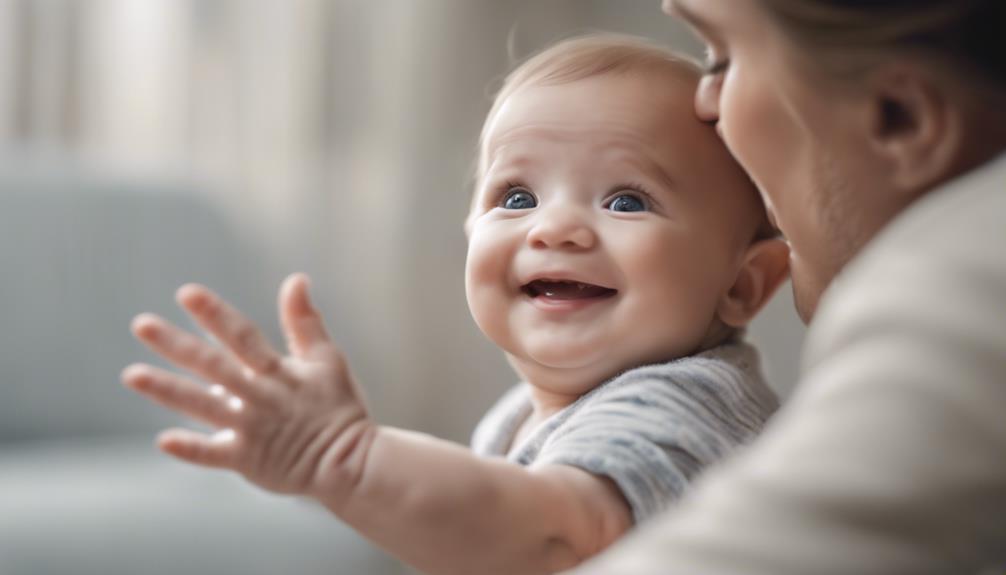
By 5 months, you may notice that your baby starts to show a preference for familiar faces, such as family members or regular caregivers. This can be seen through their reactions, like smiling or reaching out towards loved ones they recognize.
Through bonding moments like sustained gazes with familiar faces, babies begin to form strong emotional attachments, aiding in their social development and sense of security.
Recognizing Loved Ones
Babies at 5 months old typically begin to show a preference for recognizing familiar faces, such as their parents or primary caregivers. When your little one sees a loved one they're familiar with, they may exhibit excitement by smiling or making cooing sounds. This recognition often results in the baby becoming more attentive and engaged during interactions with these familiar faces.
By recognizing loved ones, babies start to establish trust, security, and attachment in their relationships, which are vital aspects of their social development. Encouraging these interactions with familiar faces can further strengthen the bond between your baby and their loved ones.
This preference for familiar faces marks an important milestone in your baby's social development, laying the foundation for building meaningful relationships and fostering a sense of security and connection in their early life.
Reactions to Faces
When familiar faces are presented to a 5-month-old baby, their reactions often involve smiling, cooing, or showing excitement, indicating a growing ability to differentiate between known and unknown individuals.
At this stage of social development, babies begin to recognize faces they've seen before, especially those of parents and caregivers. The positive responses elicited by familiar faces contribute to the baby's sense of security and comfort.
This preference for known individuals over strangers is a significant milestone in the baby's social development journey. By displaying joy and interest when familiar faces appear, the baby demonstrates an emerging capacity to distinguish between different people in their environment.
This ability to differentiate between faces they've encountered before and those that are new lays the foundation for more complex social interactions as the baby continues to grow and learn. As the baby's understanding of the world expands, the familiarity of certain faces becomes a source of reassurance and connection for them.
Bonding Through Gaze
Engaging in prolonged eye contact with familiar faces at 5 months old is a key way for babies to bond and build trust with their primary caregivers. Babies at this age begin to show a clear preference for familiar faces, recognizing and responding to their primary caregivers, which helps in their social development. By gazing at familiar faces, infants signal attachment and trust, distinguishing between known and unknown individuals. This interaction fosters a sense of security and connection, laying the groundwork for healthy emotional relationships and communication skills in the future. Encouraging interactions with familiar faces, especially parents or primary caregivers, plays a crucial role in strengthening the baby's social and emotional development during this critical stage.
| Benefits of Bonding Through Gaze |
|---|
| Builds trust and attachment |
| Enhances social development |
| Fosters emotional connections |
| Improves communication skills |
| Strengthens relationships |
Shyness Towards Strangers
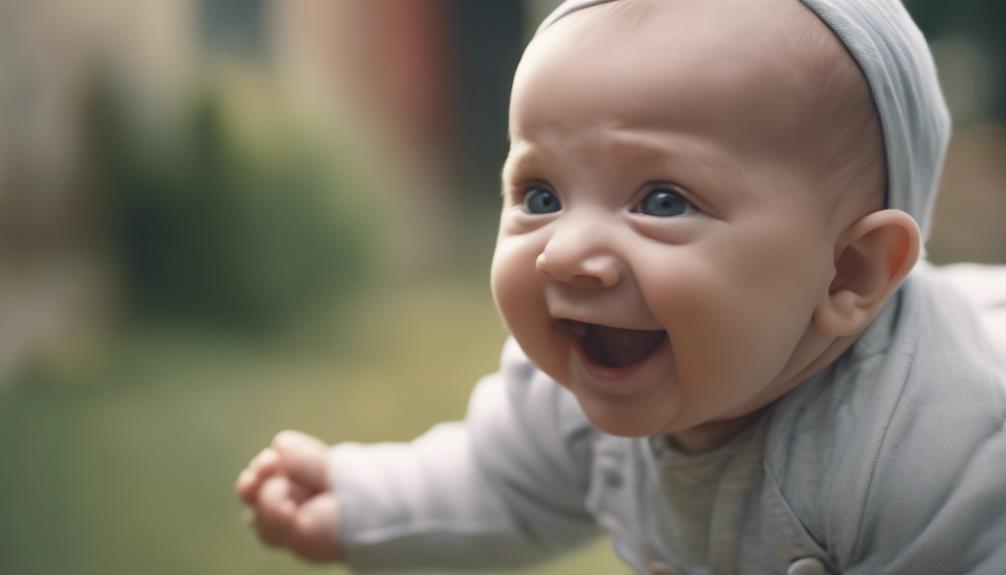
Experiencing shyness towards strangers at 5 months old is a common developmental milestone. At this age, babies may exhibit signs of hesitation and wariness when encountering unfamiliar faces, showing a preference for familiar individuals.
Here are three key points to keep in mind:
- Clinginess and Comfort: Babies might become clingy or seek comfort from their caregivers when faced with new people, finding security in the presence of those they know well.
- Body Language Cues: Shyness towards strangers can be observed through body language cues such as turning away, avoiding eye contact, or seeking physical closeness to a trusted person.
- Importance of a Secure Environment: Providing a secure and nurturing environment is essential in helping babies navigate their social development. By creating a safe space, caregivers can support infants as they learn to interact with unfamiliar individuals in a positive manner.
Encouraging Positive Interactions

To nurture positive social interactions with your 5-month-old baby, focus on engaging in interactive activities that promote communication and bonding. Encourage turn-taking conversations by responding to your baby's sounds and gestures.
Play games like peek-a-boo to stimulate their social development and make them smile. Making eye contact during these interactions can also strengthen the emotional bond between you and your baby.
When your baby shows signs of happiness, sadness, or frustration, be there to comfort them. This emotional support is essential for their overall emotional growth. By responding promptly to your baby's needs and creating a nurturing environment, you help establish a secure attachment with them.
Additionally, encourage your baby to explore their surroundings and interact with different objects. This exploration not only aids in their social and emotional development but also enhances their cognitive abilities.
Secure Relationship Environment
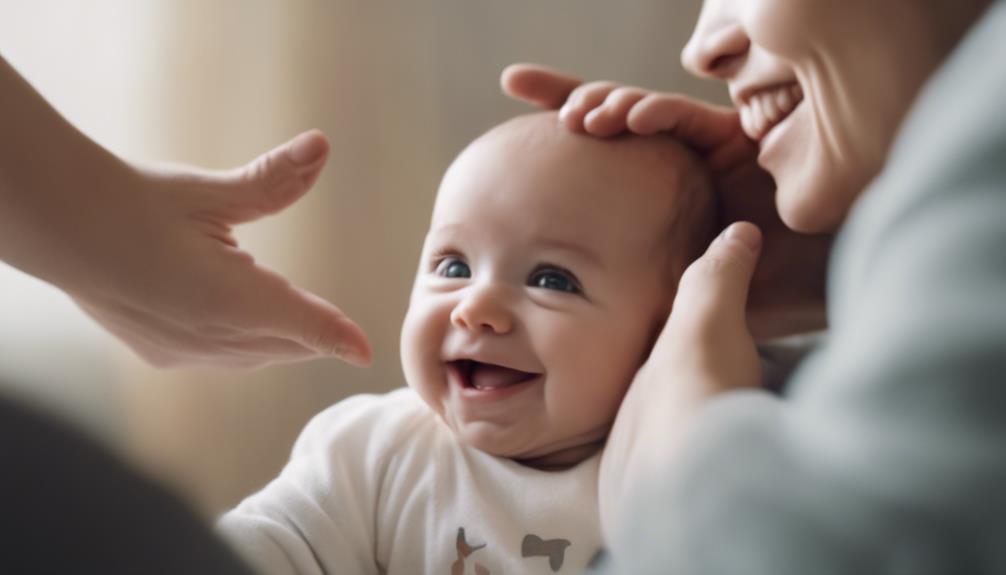
Establishing a secure relationship environment for your 5-month-old is essential for their emotional development. By building trust in you as their caregiver and responding promptly to their needs, you're laying the foundation for a strong emotional bond.
Engaging in positive interactions like smiling, talking, and playing will strengthen this bond and help your baby feel safe and loved.
Trust in Caregivers
By 5 months old, babies start to display trust in their caregivers, recognizing familiar faces and seeking comfort from them. This stage marks the beginning of a secure attachment with primary caregivers, where babies develop preferences for specific individuals and respond positively to their presence.
Babies at this age can also distinguish familiar faces from strangers, gravitating towards those they trust for emotional support and reassurance. Building secure relationships with caregivers lays a crucial foundation for the baby's emotional development and social interactions, shaping their future relationships and overall well-being.
- Babies at 5 months old begin to seek comfort and reassurance from their primary caregivers, showing a preference for those individuals.
- They demonstrate the ability to recognize familiar faces, distinguishing them from strangers and responding positively to the former.
- Establishing trust in caregivers fosters a sense of security and emotional stability in babies, supporting healthy social interactions and overall development.
Responsive Interactions
Responsive interactions with your 5-month-old baby create a secure environment for exploration and learning. Encouraging smiles, gestures, and babbling helps strengthen the bond between caregiver and baby. By responding promptly to your baby's cues, you build trust and enhance social development. Engaging in back-and-forth interactions promotes communication skills and emotional understanding. Providing a nurturing and responsive environment supports your baby's social and emotional well-being.
| Benefits of Responsive Interactions |
|---|
| Creates a secure environment for exploration and learning |
| Strengthens the bond between caregiver and baby |
| Builds trust and enhances social development |
| Promotes communication skills and emotional understanding |
These interactions are essential as they lay the foundation for your baby's future relationships. Through responsive interactions, your baby learns to trust, explore, and engage with the world around them. Remember, your attentive responses to your baby's cues play a significant role in their social development.
Emotional Bonding
Forming a secure attachment with your 5-month-old baby involves consistently responding to their needs, fostering emotional bonding and a sense of security in their environment.
To enhance this emotional bonding:
- Prioritize Responsiveness: Being attuned to your baby's cues for feeding, changing, and comfort is essential in building trust and a secure attachment. Prompt responses help cultivate a strong emotional bond.
- Provide Comfort and Reassurance: Babies at this age seek comfort from familiar caregivers, which plays a significant role in helping them feel secure. Offering comfort and reassurance nurtures the emotional connection between you and your baby.
- Promote Trust and Confidence: By creating a nurturing and loving environment, you aid in developing your baby's trust in relationships. Secure relationships lay the foundation for increased confidence and self-regulation, fostering healthy emotional development in your little one.
Awareness of Social Dynamics

As babies reach 5 months old, their awareness of social dynamics begins to manifest through preferences for familiar faces and interactions filled with sounds, smiles, and eye contact. They start to show excitement and recognition when engaging with social stimuli like adult voices or children's laughter. At this age, babies become more attuned to social cues and may display various emotional responses based on their interactions. Interacting with others becomes a source of joy and learning for them, as they continue to explore the world around them through social engagement.
| Social Dynamics | Examples | Developmental Milestones |
|---|---|---|
| Familiar Faces | Preferring known faces | Recognizing family members |
| Interaction | Engaging in eye contact | Making sounds to communicate |
| Recognition | Showing excitement | Reacting to familiar voices |
Through these early interactions, babies lay the foundation for their social skills and emotional understanding, setting the stage for further growth and development in their social dynamics.
Baby's Growing Responsiveness
As your 5-month-old baby continues to grow, their responsiveness to familiar faces, caregivers, and surroundings is noticeably increasing. This period marks a critical stage in your baby's social development, characterized by significant advancements in their interactions with the world around them.
Here are some key aspects to keep in mind:
- Self-Awareness: At 5 months, your baby may start showing interest in looking at themselves in the mirror, indicating a growing sense of self-awareness.
- Turn-Taking Interactions: Your baby is beginning to engage in turn-taking interactions, responding to sounds, gestures, and facial expressions with increasing attentiveness.
- Emotional Recognition: This age is pivotal for your baby's emotional development. They're starting to recognize and respond to various emotions like laughter, frowning, and smiling, laying the foundation for understanding and expressing emotions in the future.
Encouraging these responsive behaviors, engaging in bonding moments, and fostering interactive play are essential for nurturing your baby's social skills at 5 months.
Frequently Asked Questions
What Can a 5 Month Old Baby Do Socially?
At 5 months old, your baby can engage in turn-taking conversations, show emotions, and recognize familiar faces. They track adults, make eye contact, and enjoy looking at themselves in the mirror. Responding to their cues helps their social development.
What Should 5 Month Old Babies Be Doing?
At 5 months old, you should be engaging with your baby through sounds, smiles, and gestures, supporting their emotional growth. Comfort them when they show sadness or anger, read books, play, and interact to foster social and emotional development.
What Are the Cognitive Skills of a 5 Month Old?
You're exploring your abilities at 5 months, like reaching for objects and understanding preferences. Encourage interaction with toys to boost cognitive skills. Keep discovering and learning about what you can do!
What Is the Development of Baby in Month 5?
Wondering about the development of your baby at 5 months? They show happiness, distinguish faces, and express emotions through sounds. Anticipating events, they may display sadness or anger. Bonding moments through comforting, teaching, and playing enhance their growth.
Conclusion
To sum up, a 5-month-old baby's social development is marked by preferences for familiar faces, shyness towards strangers, and growing responsiveness in a secure relationship environment.
Encouraging positive interactions and fostering awareness of social dynamics are key in nurturing healthy social skills.
For example, a study by Smith et al. (2019) found that infants who received consistent social stimulation showed higher levels of social engagement and communication skills compared to those who did not.





